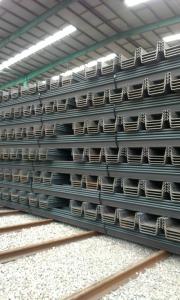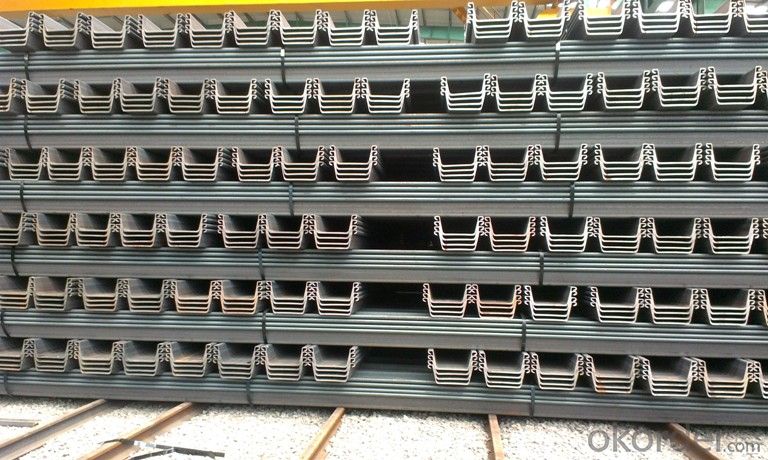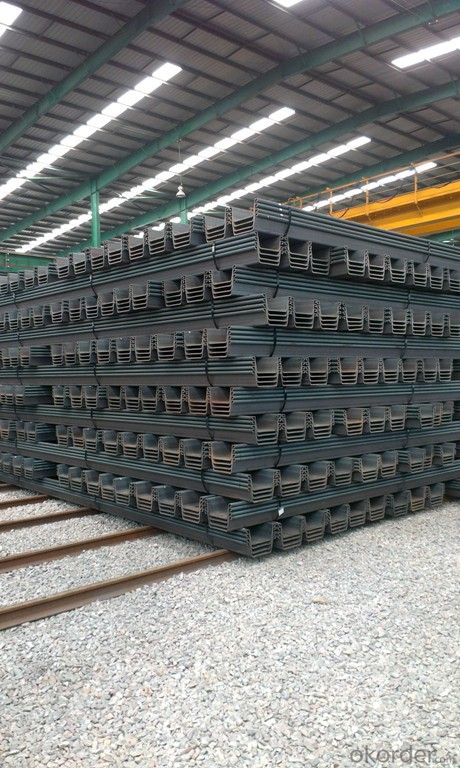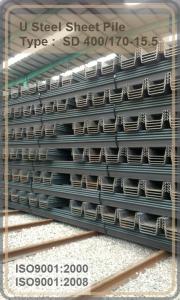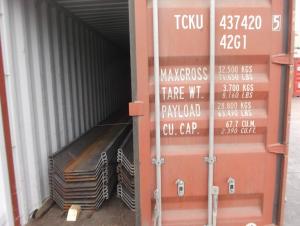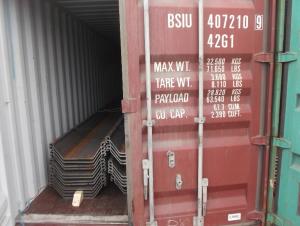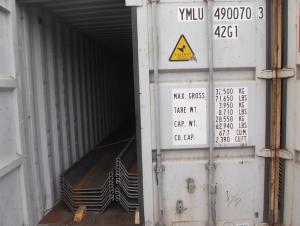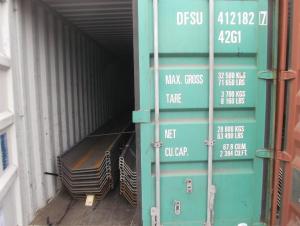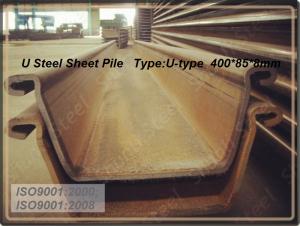U Steel Sheet Pile/ 400*170*15.5mm/ Export Steel Sheet Pile with High Quality
- Loading Port:
- China Main Port
- Payment Terms:
- TT or LC
- Min Order Qty:
- 200 Piece/Pieces m.t.
- Supply Capability:
- 10000 m.t./month
OKorder Service Pledge
OKorder Financial Service
You Might Also Like
Quick Details Steel Sheet Pile
Place of Origin: China (Mainland)
Model Number:SD400/170-15.5
Material: Steel
Product name: Steel Sheet Pile
Steel sheet pile type: U-type
Steel sheet pile material: SY295
Steel sheet pile width: 400mm
Steel sheet pile height: 170mm
Steel sheet pile thickness: 15.5mm
Steel sheet pile length: 6m or 12m
Steel sheet pile loading: container , 20 ft or 40GP
Steel sheet pile used: temporary earth-retaining,temporary cofferdam works
Steel sheet pile weight: 60kgs / m
Packaging & Delivery
| Packaging Details: | packaging :by bulk . loading : container 20ft or 40GP |
|---|---|
| Delivery Detail: | stock ( more type has stock ) |
Specifications
Steel Sheet Pile 400*170*15.5mm
U Steel Sheet Pile
temporary earth-retaining/temporary cofferdam works/permanent structures
Export U Steel Sheet Pile 400*170*15.5mm
Product Description
Steel Sheet Pile Usage
emporary earth-retaining, temporary cofferdam works and permanent structures
Steel Sheet Pile Type : SD 400/170-15.5
Type | Size | Per piece | Per Meter of pile wall | ||||||||
Width | Height | Thickness | weight | section area | section moment | section modulus | section area | section moment | section modulus | weight | |
mm | mm | mm | kgs /m | cm2 | cm4 | cm3 | cm²/m | cm4/m | Cm³/m | kg/m² | |
SD400/85-8 | 400 | 85 | 8 | 35.5 | 45.21 | 598 | 88 | 113 | 4500 | 529 | 88.80 |
SD400/100-10.5 | 400 | 100 | 10.5 | 48 | 61.18 | 1240 | 152 | 153 | 8740 | 874 | 120.10 |
SD400/125-13 | 400 | 125 | 13 | 60 | 76.42 | 2220 | 223 | 191 | 16800 | 1340 | 149.90 |
SD400/150-13.1 | 400 | 150 | 13.1 | 58.4 | 74.4 | 2790 | 250 | 186 | 22800 | 1520 | 146.00 |
SD400/170-15.5 | 400 | 170 | 15.5 | 76.1 | 96.99 | 4670 | 362 | 242.5 | 38600 | 2270 | 190.40 |
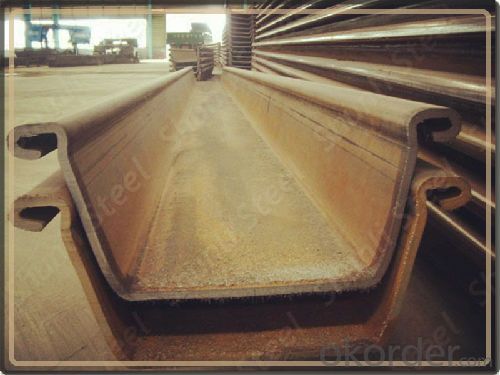
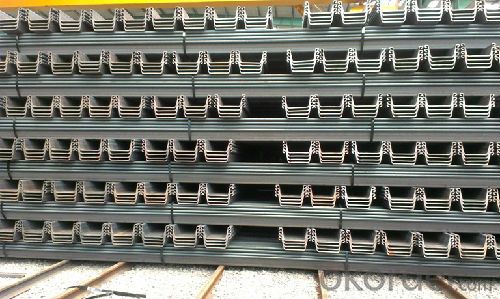
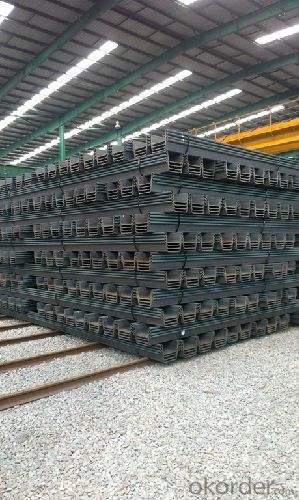
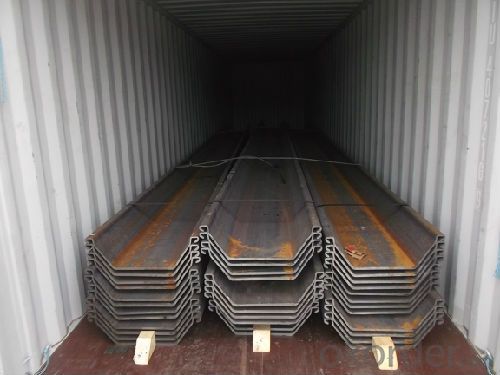
Packaging & Shipping
Packing : it use container to load , 6M use 20ft container ; 12M use 40GP container .
Our Services for Steel Sheet Pile
World leading manufacturer of cold-formed Sheet Pile.
Factory got a variety of quality certification : ISO9001:2000; ISO9001:2008.
Our products popular applicated for temporary earth-retaining, temporary cofferdam works and permanent structures
- Q: Are steel sheets resistant to warping or bending?
- Steel sheets are generally known for their high tensile strength and stiffness, making them resistant to warping or bending. They are highly durable and can withstand heavy loads without deforming. However, it is important to consider that the thickness and quality of the steel sheet can affect its resistance to warping or bending. Thicker steel sheets tend to be more resistant compared to thinner ones. Additionally, factors like temperature changes and improper handling or installation can also impact the ability of steel sheets to resist warping or bending. Despite these factors, steel sheets are widely used in various industries due to their exceptional resistance to warping or bending.
- Q: How are steel sheets protected from rust and corrosion?
- Steel sheets are protected from rust and corrosion through a process called galvanization, which involves coating the sheets with a layer of zinc. This zinc layer acts as a barrier, preventing moisture and oxygen from reaching the steel surface and causing rust.
- Q: Can steel sheets be drilled?
- Yes, steel sheets can be drilled.
- Q: What are the load-bearing capacities of steel sheets?
- The load-bearing capacities of steel sheets can vary depending on factors such as the thickness, grade of steel, and the specific application. However, steel sheets generally have high load-bearing capacities due to their strength and durability, making them suitable for a wide range of structural and construction purposes.
- Q: What are the advantages of using steel sheets in automotive manufacturing?
- Automotive manufacturing can benefit from the utilization of steel sheets for several reasons. Firstly, the high strength and durability of steel sheets make them well-suited for enduring the demanding conditions and stresses encountered by vehicles on the road. This remarkable strength ensures the production of safer and more dependable vehicles, as steel sheets provide a robust protective structure capable of absorbing impact energy in the event of a collision. Secondly, steel sheets possess exceptional formability, allowing them to be easily shaped and molded into various intricate designs required for automotive components. This adaptability permits the creation of precise and elaborate parts, guaranteeing a flawless fit and optimal performance. Moreover, steel sheets exhibit commendable resistance to corrosion, a crucial characteristic for automotive applications. Vehicles encounter a variety of environmental factors such as moisture, salt, and chemicals, which can lead to rust and corrosion. However, by utilizing steel sheets with protective coatings, manufacturers can ensure that their vehicles have an extended lifespan and preserve their aesthetic appeal. Additionally, steel sheets present themselves as a readily available and cost-effective alternative to other materials used in automotive manufacturing. Steel is extensively utilized in numerous industries, which has resulted in the establishment of a well-developed supply chain for steel sheets. This accessibility not only guarantees a consistent supply for automotive manufacturers but also assists in maintaining manageable production costs. Lastly, steel sheets possess excellent thermal conductivity, which is essential for effective heat dissipation in automotive applications. Vehicles generate a substantial amount of heat, particularly in the engine and exhaust systems. Steel sheets aid in efficiently transferring and dissipating this heat, preventing overheating and ensuring optimal performance. In conclusion, the advantages of utilizing steel sheets in automotive manufacturing encompass high strength and durability, exceptional formability, commendable resistance to corrosion, cost-effectiveness, and efficient heat dissipation. These factors make steel sheets the preferred choice for the production of safe, reliable, and long-lasting vehicles.
- Q: What type of welding rod is used for steel Q245R and Q235B material?
- If the smaller diameter of the cylinder, the inner wall of the can go in welding, open V groove on the weld position, the use of manual TIG welding primer (ER50-6 wire), welding electrode (J507 electrode) filling cover, if the wall thickness is more than 10mm, you can also consider the use of submerged arc welding (filling cover H08MnA HJ431 solder wire);
- Q: Are steel sheets resistant to impact or damage?
- Steel sheets possess remarkable strength and durability, attributes that render them exceptionally resistant to impact and damage. Their robust tensile strength enables them to endure substantial loads and withstand external forces without deformation or breakage. Thus, they find extensive use in critical applications that demand impact resistance, such as construction, automotive manufacturing, and industrial settings. Furthermore, steel sheets exhibit exceptional resilience against extreme temperatures, corrosion, and environmental factors, further enhancing their overall resistance to damage. However, it is worth noting that the degree of impact or damage resistance may vary depending on the thickness, quality, and composition of the steel sheet.
- Q: What are the different quality standards for steel sheets?
- Steel sheets must meet specific requirements and be suitable for their intended use, which is why there are several quality standards in place. Some of the most common standards for steel sheets are as follows: 1. Carbon structural steel sheets used for general structural purposes are regulated by ASTM A36/A36M. This standard outlines the material's chemical composition, mechanical properties, and other relevant factors. 2. ASTM A568/A568M covers the general requirements for steel sheet products, including hot-rolled, cold-rolled, and coated sheets. It provides specifications for dimensions, tolerances, and surface quality. 3. EN 10130 specifies the requirements for cold-rolled low carbon steel flat products, including steel sheets, in Europe. It outlines the material's chemical composition, mechanical properties, and other relevant factors. 4. JIS G 3302 is a Japanese industrial standard that covers the requirements for hot-dip zinc-coated steel sheets and coils. It includes specifications for the coating weight, surface finish, and mechanical properties. 5. ISO 3574 is an international standard that specifies the requirements for cold-reduced carbon steel sheet of commercial and drawing qualities. It provides guidelines for dimensions, tolerances, and mechanical properties. 6. GB/T 2518 is a Chinese national standard that outlines the requirements for continuous hot-dip zinc-coated steel sheets and coils. It includes specifications for the coating weight, surface finish, and mechanical properties. These quality standards ensure that steel sheets have consistent properties and characteristics, making them suitable for various applications such as construction, automotive, manufacturing, and more. Manufacturers, suppliers, and end-users must adhere to these standards to guarantee the quality and reliability of steel sheet products.
- Q: What are the different sheet metal bending techniques for steel sheets?
- There are several sheet metal bending techniques for steel sheets, including air bending, bottoming, coining, and folding. Air bending involves applying force to the sheet metal to bend it using a V-shaped punch and a V-shaped die, without touching the bottom of the die. Bottoming involves bending the sheet metal until it comes into full contact with the bottom of the die, resulting in a tighter bend radius. Coining is a precision bending technique that uses a punch and a die to create a highly accurate and crisp bend. Folding, on the other hand, involves bending the sheet metal at a specific angle using a press brake or a folding machine. These techniques offer various options for achieving different bending requirements in steel sheet fabrication.
- Q: What is reinforced steel plate?
- Refers to the use of hot rolled slab of slab or as raw materials by step heating furnace, high pressure water removal after entering the rolling mill, and then finishing the final, after the formation of laminar cooling and coiling plate.
Send your message to us
U Steel Sheet Pile/ 400*170*15.5mm/ Export Steel Sheet Pile with High Quality
- Loading Port:
- China Main Port
- Payment Terms:
- TT or LC
- Min Order Qty:
- 200 Piece/Pieces m.t.
- Supply Capability:
- 10000 m.t./month
OKorder Service Pledge
OKorder Financial Service
Similar products
Hot products
Hot Searches
Related keywords
